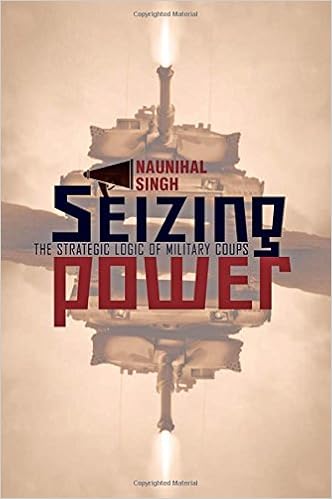 While coups drive a majority of regime changes and are responsible for the overthrow of many democratic governments, there has been very little empirical work on the subject. Seizing Power develops a new theory of coup dynamics and outcomes, drawing on 300 hours of interviews with coup participants and an original dataset of 471 coup attempts worldwide from 1950 to 2000. Naunihal Singh delivers a concise and empirical evaluation, arguing that understanding the dynamics of military factions is essential to predicting the success or failure of coups.
While coups drive a majority of regime changes and are responsible for the overthrow of many democratic governments, there has been very little empirical work on the subject. Seizing Power develops a new theory of coup dynamics and outcomes, drawing on 300 hours of interviews with coup participants and an original dataset of 471 coup attempts worldwide from 1950 to 2000. Naunihal Singh delivers a concise and empirical evaluation, arguing that understanding the dynamics of military factions is essential to predicting the success or failure of coups.
“Naunihal Singh spells out a simple, yet powerful insight: the best way to understand military coups is by focusing on their dynamics rather than their correlates. He then goes on to show that coup outcomes are best predicted through a coordination framework, rather than by analyzing them as military or popularity contests. Fascinating and comprehensive, Seizing Power is the best piece of social science research on military coups so far. It should be read by all those interested in the study of political violence.”
– Stathis Kalyvas, Arnold Wolfers Professor of Political Science, Yale University
Selected Media Appearances
- Trump and Africa: Rex Tillerson tours the continent on France24 TV
- The Lawfare Podcast: Naunihal Singh on Zimbabwe and the Strategic Logic of Military Coups
In The Press
- What ‘Black Panther’s’ Wakanda can teach us about Africa’s history — and its future
- Is Zimbabwe ready to move on without Mugabe?
- Can Burkina Faso — Africa’s most coup-prone state — become a stable democracy?
- #BlackLivesMatter, the international papal edition
- Why popular opinion can’t predict a coup
- How To Bring Back The Nigerian Schoolgirls, Three Months On
- Egypt’s Ordinary Coup
- White Smoke And A Black Pope: Is Turkson The Church’s Future?
- An American Tragedy